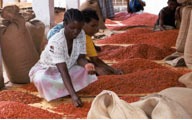
Joining Smallholders Together to Increase Economic Opportunities
Malawi is one of Africa’s most densely populated countries, with more than 200 people to each square kilometer, and with a national average family landholding of only one hectare. Agriculture plays a vital role in the economy—accounting for 85 percent of the labor force, 35 percent of GDP and 90 percent of foreign export earnings. Malawi is also one of the poorest countries in Africa, with a per capita GDP at less than half the sub-Saharan African average, and with the highest income inequality in Africa. Life expectancy is a mere 41 years, and HIV/AIDS and child mortality rates are amongst the highest in the world.
To address these problems, Malawi’s first democratically elected government, which took office in May 1994, adopted a set of economic policies aimed at the alleviation of poverty. A key element of these policies was the liberalization of agricultural production and marketing, essential to raising incomes amongst Malawi’s resource poor smallholder farmers. In support of this liberalization, USAID funded ACDI/VOCA’s Smallholder Agribusiness Development Project (SADP), launched in 1995.
SADP established seven agribusiness development centers (ADCs) located in key smallholder growing areas. Staff from these ADCs began by helping farmers form small clubs at the grassroots, whose members then created informal group action committees (GACs) to address a range of constraints the farmers were facing in marketing their crops (transportation, quality, storage, marketing linkages, financial services and government policies). District-level GACs subsequently formed self-financing shareholder-owned and -controlled agribusiness associations, which in turn established the National Smallholder Farmers’ Association of Malawi (NASFAM).
NASFAM today represents over 108,000 farm families, with women constituting 31 percent of association committee members, and 38 percent of the total membership. NASFAM provides a variety of member services financed through an ongoing government levy, user fees, membership dues and external donor support. These services include training in business management, marketing, quality control, literacy and basic education and information services to 200,000 farm families through a monthly trilingual newsletter and a weekly radio program. The policy and advocacy unit addresses policies that impact smallholder producers and agribusinesses. Business partnerships have been facilitated between the 38 agribusiness associations and private sector input suppliers and financial service providers. ACDI/VOCA and NASFAM through the SADP and its successor, the NASFAM Strengthening Project, which was implemented 2000-2003, has helped Malawi’s smallholder farmers take control of their lives and enabled them to send more children to school, buy medical services when needed, improve their families’ nutrition and housing, and reinvest their profits in rural microenterprise activities.
As it approached its fifth anniversary, NASFAM elected to embark on a restructuring process to turn it into a holding company with two subsidiaries: a for-profit NASFAM Commodity and Marketing Exchange (NASCOMEX) and a donor-subsidized Center for Development Support (NASCENT). NASCOMEX houses the revenue-generating private-sector business and marketing services, and NASCENT provides “soft” services that straddle the public-private goods divide, such as information services, training, advocacy and outreach. By separating out the two roles of the association, NASFAM is ensuring that it is able to operate both as a transparent business entity serving its member-owners, and as an instrument for economic and social grassroots community development.
“We want to support the farmer; we want the poor farmers to get rich; we want them to be able to send their kids to school; we want them to be healthy, well fed and happy. In the final analysis we want them to earn money. This is where NASFAM fits in so well; where it has made the biggest difference so far. Even from the same levels of production, farmers are earning more. NASFAM’s training of farmers, its emphasis on diversification and on marketing, its optimal mix of resources for the farmer make NASFAM a real model for the future,” according to Dr. Ellard Malindi, Malawi’s Permanent Secretary of Agriculture and Irrigation.





